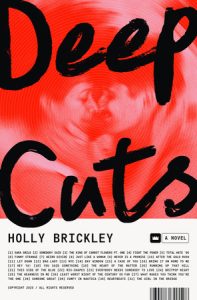Friendships, romances, jobs
Deep Cuts
by Holly Brickley
Toronto: Doubleday, 2025
$26.99 / 9780385699907
Reviewed by Jessica Poon
*

When I was younger and undatable by most measures, I had exacting standards and some iron-clad, absolutely not dealbreakers. One of them was: don’t date musicians. I felt, with a surety that had nothing to do with any actual lived experience, that a musician would break my heart, pretend a song written for me was meant for my significantly prettier successor, leave me interminably jaded, and condemn me to a life of dubious poetry about thwarted love. I did not want to be a musician’s fool, or a writer of sad girl poetry. Actually, against my will, the latter might have happened, but the point is, I knew musicians were sexy and sexy musicians were bad news. Sexiness is fleeting; bad news is a haunted lifetime and a therapist, evincing the slightest hint of boredom, saying, “You want to talk about the musician again?”
So, I found myself immediately sympathetic to the protagonist of Deep Cuts by Portlander (by way of Hope, BC) Holly Brickley, which begins in 2000. Percy Marks meets Joe Morrow, who definitely is a sexy musician and genuinely talented. Percy provides astute commentary on Joe’s songwriting; it’s not long before they become collaborators. Percy thinks: “A boy like that was born with a girlfriend.” Indeed, he does, in the form of Zoe, a longtime girlfriend, a “tasteful punk” with a punk zine called Ring Finger. Complicating, but also simplifying matters, is Zoe’s recent coming out as a lesbian. When Joe and Zoe inevitably break up, Joe and Percy, acknowledge their mutual attraction but decide their musical collaboration is too important to risk.
When Joe first invites Percy to spend time with him and Zoe, Percy recalls the scene:
“I don’t hang out with musicians.”
“And why is that?” he asked with a laugh, walking backward toward the door.
Because they make me unbearably jealous. “Because they always disappoint me,” I said, which was also true.
Percy, encouraged to write for Ring Finger, develops her own idiosyncratic, personal voice when it comes to writing about music. Sometimes, writer characters are in possession of marginal talent and, somehow, numerous accolades. For instance, Noah from Showtime’s The Affair, is an acclaimed writer with a novel featuring this ostensibly piquant line: “She was sex.” If the writing is good, it’s usually indistinguishable from the author’s own writing, though I don’t necessarily view this as a bad thing. It’s true that Percy’s writing voice is much like Holly Brickley’s—by which I mean, completely delightful, passionately detailed, self-consciously vulnerable, and often funny. When Percy writes about her mother, the character building is decadent, such that I longed for Percy’s mother to actually be on the page, not just a fulsome, hilarious character with a knack for evisceration.
For example:
My mom isn’t like your mom. She hates almost everything: restaurants (“How do you know what they’re putting in the food?”), museums (“Art zoos!”), travel (“Bragging rights for sale”), camping (“Trying on homelessness”). Music is our only common interest, but she ruins that too by having the world’s stuffiest taste. Mozart, Beethoven, all those white-wigged ghosts.
And:
My mom was my piano teacher for one stressful year in grade school.… Post-boobs, pre-bra.… the foot pedal required a level of concentration from me that seemed to cause my mom actual concern .… When I finally begged out of our lessons, she failed miserably at hiding her relief.
There were people who could make something like “Surf’s Up,” I decided—people with talent—and there were people like me who could only appreciate it. But at least I had that.
Percy’s belief that she is better as an appreciator and critic than a creator reminds me of a line from Mariam Rahmani’s debut novel, Liquid: “… the critic wasn’t a leech but a storyteller in her own right. To critique was to honour the world with some minor truth.” While in a way this belief is empowering—a stark contrast to the pedagogically invalidating “Those who can’t do, teach”—it is also a self-limiting belief. Sure, Percy might not be much of a pianist, but if she can identify what could improve Joe’s music, or what isn’t working—then that’s a real talent. Maybe even a rarer one than Joe’s.
Percy is desperate to lose her virginity, which is not only dissatisfying, but incredibly painful. She thinks:
… I felt no attraction to him. But that was okay. My theory, which had arrived in full that morning, as if implanted in my brain during my sleep, was this: in order to close this anxious semi-virginal chapter of my life and become a fully formed adult with the capacity to find her own purpose, I needed to complete the act with the same wrong guy. I didn’t have time to start from scratch finding the right guy—I was practically about to graduate from college, for God’s sake—and I certainly couldn’t risk a fresh new humiliation with a different wrong guy.
The idea that one’s first sexual experience is a transcendent rite of passage, a veritable antecedent to suddenly becoming a wise adult, is maybe one of the biggest lies that society continues to promulgate, to say nothing for the outsized importance attached to penetrative intercourse in particular.

Percy’s experience of penetrative intercourse is painful, just as she anticipates. Her partner is, presumably, oblivious. It’s all very typical heterosexual mating protocol and I’m getting sad just thinking about how dreadfully common and misguided all of this is. The experience is so painful that Percy assumes, incorrectly, that all penetrative intercourse will always be that painful for her. Given the prevalence of “And then she came basically once she felt my dick” types of sex scenes, I found Brickley’s depiction of Percy’s uncomfortable first-time sex—with long-lasting negative ramifications—to be painfully authentic. It’s also, perhaps, a good reminder that sex ed is, generally speaking, uniformly terrible—of course arousal level affects physical sensations, but this is not something Percy is aware of for a long time.
As a result of her first sexual experience, Percy abstains from the act entirely in her first romantic relationship with Raj, who she meets during her MFA in Creative Writing, which takes place in New York. Her relationship with Raj is genuinely sweet, though it does immediately have the whiff of placeholding for something more significant. Percy realizes he must fancy her after he listens to Neko Case, as per her recommendation, an insight that irresistibly reminds me of a passage from Seeing Other People by Diana Reid: “If you recommend something—a book, a TV show, a movie, a song—and the other person accepted that recommendation, they may very well want to sleep with you. The shorter the time between the recommendation and uptake, the more carnal the intention.”
Percy’s rekindled friendship with Zoe serves as a welcome reminder that friendships are also love stories—not inferior ones, but different ones—and it’s all the more intimate for a close friendship between women who were once, at different points in time, interested in the same sexy musician. At one point, Zoe observes, perhaps as a stand-in for the reader: “Honestly, how many different ways is it even possible for the same two people to break each other’s hearts?” Of Percy’s career as a music journalist, Zoe says: “You found a way to judge people for a living. It’s amazing, really.” Later, Percy says to Zoe: “I love you more than Joe.” Quite simply, I love Percy’s friendship with Zoe.
Percy is witty, self-deprecating, and likeable, but also prone to insecurity and jealousy. Her curiosity, for instance, over how many sexual partners Joe has had since Zoe, does not go over well. Certainly, there were times I wanted to shake her and tell her to get her head out of her ass, to stop self-sabotaging, to communicate better than a Sally Rooney character, to have more perspective. But the whole time, I was rooting for her—her burgeoning emotional maturity, her career, her romantic odyssey, and for her friends.
Deep Cuts is a fantastic debut novel that aptly captures being in your twenties, loving music, and chaotic will-they-won’t-they romance. Winsome, full of heart, and with unusually excellent dialogue, Deep Cuts is destined to become a fondly dog-eared novel, meant to be reread and replayed.

*

Originally from East Vancouver, Jessica Poon is a writer, former line cook, and pianist of dubious merit who recently returned to BC after completing a MFA in Creative Writing at the University of Guelph. [Editor’s note: Jessica Poon interviewed Sheung-King, and recently reviewed books by Alastair McAlpine, Jack Wang, Bal Khabra, Christopher Cheung, Anne Hawk, Pat Dobie, and Giana Darling for BCR.]
*
The British Columbia Review
Interim Editors, 2023-26: Trevor Marc Hughes (non-fiction), Brett Josef Grubisic (fiction and poetry)
Publisher: Richard Mackie
Formerly The Ormsby Review, The British Columbia Review is an on-line book review and journal service for BC writers and readers. The Advisory Board now consists of Jean Barman, Wade Davis, Robin Fisher, Barry Gough, Hugh Johnston, Kathy Mezei, Patricia Roy, and Graeme Wynn. Provincial Government Patron (since September 2018): Creative BC. Honorary Patron: Yosef Wosk. Scholarly Patron: SFU Graduate Liberal Studies. The British Columbia Review was founded in 2016 by Richard Mackie and Alan Twigg.
“Only connect.” – E.M. Forster